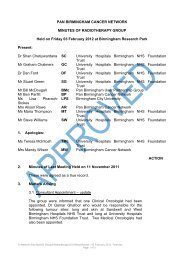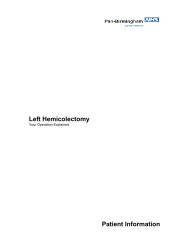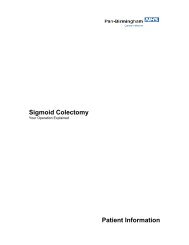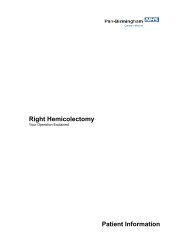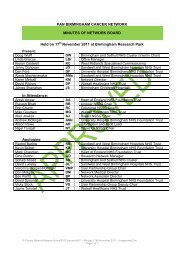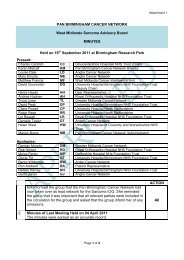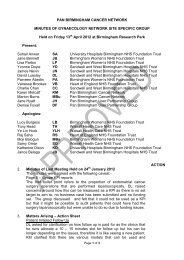Anterior Resection - NHS Pan Birmingham Cancer Network
Anterior Resection - NHS Pan Birmingham Cancer Network
Anterior Resection - NHS Pan Birmingham Cancer Network
You also want an ePaper? Increase the reach of your titles
YUMPU automatically turns print PDFs into web optimized ePapers that Google loves.
Pain relief will be discussed with you by your anaesthetist. You may be<br />
given analgesia (painkillers) through an epidural (tube in your back) or<br />
through a drip in your arm in the form of a PCA (patient controlled<br />
analgesia) hand held pump. This means you control the amount of<br />
painkiller you require. If you would like to talk about this further please<br />
ask the ward staff to contact one of the pain management nurses.<br />
A nurse will take you to theatre. Your operation will usually take between<br />
two and four hours.<br />
After your operation<br />
Immediately after surgery you may have a number of tubes attached to<br />
your body. You may have:<br />
• An intravenous infusion (drip tube), usually in your arm to feed you<br />
with fluids and often used to give drugs as well.<br />
• A catheter (tube) in your bladder to drain urine.<br />
• A tube, either in your arm (PCA) or in your back (epidural), slowly<br />
releasing painkillers.<br />
• Drainage tubes at the site of the operation to clear away any oozing<br />
fluids around the operation site inside.<br />
• Continuous oxygen by a face mask or small tube placed to your nose.<br />
Most of the tubes are put in place while you are under anaesthetic. Over<br />
a period of two to three days many or all of these tubes will be removed.<br />
People recover from surgery at different rates. The average stay in<br />
hospital is four to eight days but you may need to stay in longer. This<br />
will be discussed with you by your surgeon or colorectal nurse.<br />
About two to three weeks after your surgery a report from histopathology<br />
(examination under the microscope) on the piece of bowel removed<br />
during the operation will be sent to your surgeon. Depending on the<br />
results, further treatment may be offered, the details of which will be<br />
discussed with you. If there is an option for further treatment such as<br />
chemotherapy, an appointment will sometimes be made directly with an<br />
oncologist (cancer specialist).<br />
When can I start to eat and drink?<br />
Your bowel function may rapidly return to normal. Most patients should<br />
be able to have a drink when they wake and should be allowed to eat<br />
soon after.<br />
If you have any questions about your diet, please ask your colorectal<br />
nurse who can advise you. Eating a balanced healthy diet after your<br />
7



